August 22 designated as day to honor victims of religious violence around the world

Acts of religious violence are on the rise around the world, not only at the hands of authoritarian governments, but also from individual and organized extremists who terrorize groups on the basis of religion. Religious persecution is increasing throughout Asia, and in the Middle East, where the “state of Christianity” is “precarious.” Even here in the U.S., we have seen deadly attacks on houses of worship in recent years, including a Jewish Community Center in Pittsburgh, a synagogue near San Diego, and churches in Louisiana.
In response to this growing threat, the U.N. General Assembly has declared August 22 the International Day Commemorating the Victims of Acts of Violence Based on Religion or Belief. The U.N.’s action sought specifically to honor the victims of Easter Sunday church bombings in Sri Lanka, and the attack on the Christ Church mosque in New Zealand, but noted it is intended to commemorate all victims of religious violence around the world.
According to a U.N.press release, Jacek Czaputowicz, Minister for Foreign Affairs of Poland, explained the resolution’s aim as he introduced it:
Hatred towards religious groups may lead to mass killing of innocent people, he cautioned, citing reports that one third of the world’s population suffers from some form of religious persecution. Acts of terror are intended to intimidate members of religious communities and, as a result, to hold them back from practicing their faith. …
The resolution does not relate to any specific religion or belief, but to all victims of violence and seeks to raise awareness of the importance of respect for religious diversity, he added.
Calling attention to the plight of religious minorities and victims is an important step in addressing the growing scourge of religious violence worldwide. Acts of violence and persecution directed at religious groups is damaging to the cause of religious freedom for all, regardless of whether a government action or policy is responsible. The freedom to practice one’s faith must include the right to be free from the fear of violence because of one’s religious beliefs or identity. And when any one person’s religious freedom is denied, imperiled, or fraught with danger, the rights of all of us are in jeopardy. If we can’t or won’t speak out to protect others, who will protect us?




